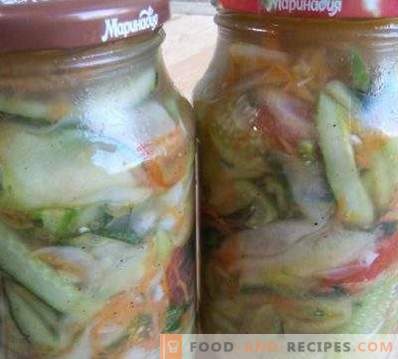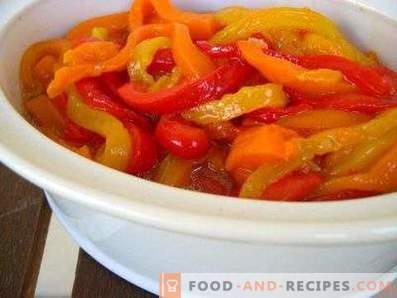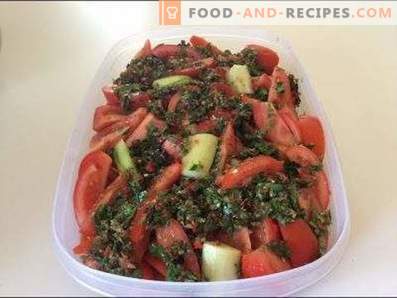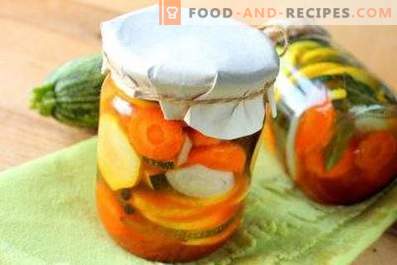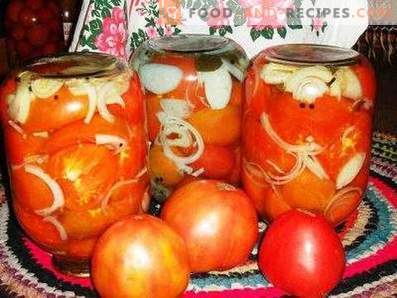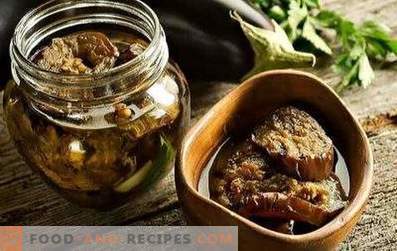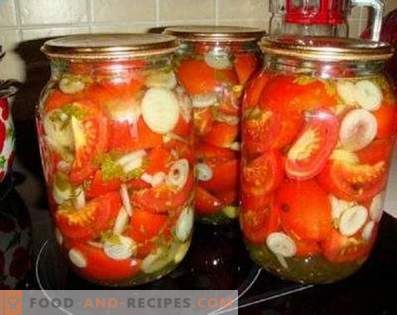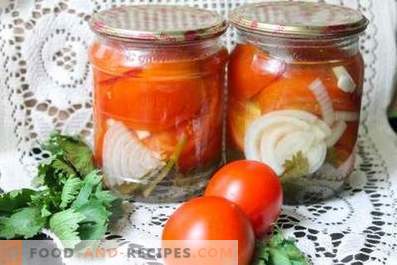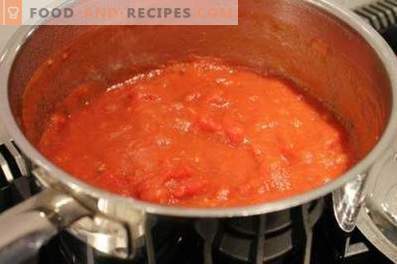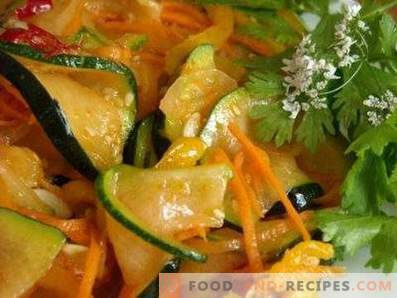
Zucchini differ from zucchini not only in a more elongated shape and a dark green color of the peel, but also in taste - it is more pronounced, slightly sweet, and vaguely resembling the taste of a pumpkin. Preparations for the winter from zucchini are almost the same as from zucchini, but gourmets are able to catch the difference in the organoleptic qualities of these dishes. Despite the fact that the recipes for canning these vegetables are similar, they are not completely identical. If you try to prepare zucchini for the winter in Korean, you will almost certainly notice this difference, since in these snacks their taste is revealed very well.
Cooking Features
The process of cooking zucchini snacks in Korean for the winter is simple, especially if you choose a recipe without sterilization. However, without knowing some subtleties, the result may not meet the expectations.
- Zucchini never grow as large as zucchini, but this does not mean that, when overripe, they remain as tender as the young ones. Inside they may come across large seeds, the skin may be excessively dense. If you notice that the zucchini fruits are overripe, it is better to spend time on removing the pulp with large seeds and coarse skin than to spoil the snack.
- You can grind zucchini to cook Korean snacks for the winter in different ways. Usually they are cut into strips or rubbed on a special grater, but sometimes they are cut into circles, semicircles, bars, or even cubes. Other vegetables that make up the salad are most often ground in the same way as the main ingredient.
- The unique flavor of Korean snacks is given by a special bouquet of spices. It includes garlic, red and black pepper, coriander. Sometimes it can be included in nutmeg, turmeric, cloves. If you are familiar with Korean cuisine, you can choose the seasonings yourself, adding them to the salad in any ratio. In the absence of culinary experience, it is advisable to use the recommendations accompanying the selected recipe, or use a ready-made set of seasonings from the supermarket.
- Banks for zucchini in Korean should not only be washed well, but also be sterilized, otherwise the snack will quickly deteriorate. The lids are also sterilized, usually by boiling. Plastic lids snacks can be closed only if it will be stored exclusively in the refrigerator and not more than 2 months. For storage indoors canned food is closed with metal lids, ensuring tightness.
The storage conditions for zucchini in Korean, preserved for the winter, depend on the recipe used. Usually, these snacks do not spoil even at room temperature.
Korean Zucchini with sterilization
Composition (2 liters):
- zucchini - 1, 5 kg;
- carrots - 0, 25 kg;
- onions - 0, 25 kg;
- Bulgarian pepper - 0, 5 kg;
- table vinegar (9 percent) - 100 ml;
- vegetable oil - 40 ml;
- sugar - 100 g;
- salt - 20 g;
- garlic - 10 cloves;
- spices for carrots in Korean - 15 g;
- fresh greens (optional) - 50-100 g.
Method of preparation:
- Wash vegetables, clean if necessary, dry with a napkin.
- Chop carrots and zucchini with a grater for preparing Korean salads, or cut into strips.
- Pepper, cleared of seeds, cut into strips of approximately the same size as the other vegetables.
- Cut onion into thin half-rings or quarters crown, if you find large onion bulbs.
- Fold the vegetables into the pan, add the finely chopped greens and garlic to them, add salt, sugar and spices. Mix well.
- Leave the vegetable mixture for 3-4 hours in a cool place. Stir it about once an hour.
- After a specified time, add oil and vinegar, mix.
- Sterilize the jars and their lids.
- Spread the snack on the cans, tamping it with a spoon. Pour marinade.
- Put a towel in the pot, put the jars on it, pour water into the pot. Water should be at the level of the hanger cans.
- Put the pan on a slow fire, bring the water to a boil. Sterilize jars for 20-35 minutes depending on their volume. 20 minutes is required to sterilize a half-liter container.
- Remove the jars from the pan, hermetically sealed. You do not need to wrap up, otherwise zucchini can lose a pleasant crunchiness.
A snack prepared according to this recipe can be stored at room temperature, but it will not spoil in a cool room for longer.
Zucchini in Korean for the winter without sterilization
Composition (1 l):
- zucchini - 0.6 kg;
- carrots - 0, 25 kg;
- Bulgarian pepper - 0, 25 kg;
- apple cider vinegar (6%) - 100 ml;
- vegetable oil - 100 ml;
- salt - 10 g;
- sugar - 10 g;
- a mixture of peppers - 10 g;
- ground coriander - 10 g;
- dried garlic - 10 g.
Method of preparation:
- Prepare the vegetables by washing them out and drying them with a napkin.
- Grate carrots and zucchini on a special grater.
- Pepper, free from seeds, scoop straws.
- Stir the vegetables by placing in a saucepan.
- Mix oil, vinegar, salt, sugar, seasonings separately.
- Fill the vegetables with marinade, mix, leave for an hour.
- Bring to a boil over low heat, boil for 5 minutes.
- Spread the snack on the prepared jars, tamp with a spoon, cover with hot marinade and roll up.
- Turning over, wrap, leave to cool in this state for additional preservation.
Although the recipe is prepared without sterilization according to this recipe, it is well worth it at room temperature.
Zucchini in Korean with mustard
Composition (1 l):
- zucchini - 0.5 kg;
- onions - 0, 3 kg;
- carrots - 0, 3 kg;
- parsley - 50 g;
- garlic - 3 cloves;
- mustard powder - 15 g;
- Korean spices - 15 g;
- vegetable oil - 100 ml;
- salt - 20 g;
- sugar - 20 g;
- Table vinegar (9%) - 40 ml.
Method of preparation:
- Cut carrots and squash into thin semi-circles (the thinner the better).
- Peel the onion, cut it into thin half-rings.
- Pass the garlic through the press. Stir the vegetables.
- Heat the oil, put Korean seasonings and mustard in it, stir, add vinegar, bring to a boil and remove from heat.
- Fill the vegetables with marinade, while adding chopped parsley, sugar and salt.
- Marinate vegetables for 8-12 hours in a cool place.
- Spread over prepared banks. Sterilize for 30-60 minutes in a water bath. Roll up.
An appetizer made according to this recipe has an unusual savory taste, which will be even more expressive if you fill a salad with a spoon of honey before serving it. Canned food can be stored at room temperature.
Zucchini in Korean are tender, sweet-sour and moderately spicy. If you prepare them for the winter, adhering to the correct technology, they will not deteriorate at room temperature and will delight you in the cold season.



